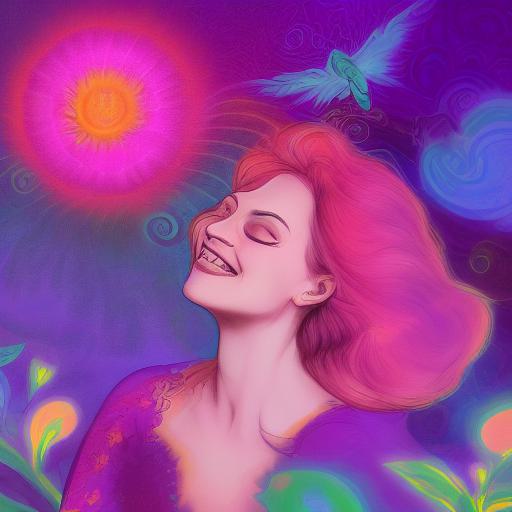How to write this prompt?
Here’s a breakdown of the AI image prompt and how each element contributes to the overall image being generated:
- Digital 2D fantasy psychedelic artwork painting – This sets the overall style and genre for the image being generated. It informs the AI model to focus on creating a colorful and imaginative scene that is not bound by reality.
- Woman holding a laughing flower – This provides a specific subject for the image being generated. The AI model will focus on creating a female character holding a flower, with the flower being a prominent element of the image.
- Captured in an aerial view and realistic rendering – This sets the perspective and level of detail for the image being generated. The AI model will create a scene that is viewed from above, with a high level of realism in terms of the textures and lighting.
- Soft lighting effect of the moonlight shining through the clouds – This provides a specific lighting condition for the image being generated. The AI model will focus on creating a scene with a gentle and dreamy atmosphere, with moonlight shining through the clouds.
- Creating a dreamy and peaceful atmosphere – This sets the mood for the image being generated. The AI model will create a scene that is peaceful and calming, with an emphasis on creating a serene atmosphere.
- Color of the laughing flower changed to magenta – This provides a specific color scheme for the image being generated. The AI model will focus on creating a flower with a magenta color, which will add a bold and vibrant contrast to the overall image.
Overall, each element of the AI image prompt contributes to the final image being generated by providing specific instructions on the style, subject, perspective, lighting, mood, and color scheme. By carefully crafting an AI image prompt that includes these elements, it is possible to generate highly detailed and imaginative images that match the desired vision.
What is the significance of the laughing flower in fantasy art?
The laughing flower is a common element in fantasy art that symbolizes joy, happiness, and whimsy. It is often depicted as a magical or otherworldly flower that has the power to bring laughter and merriment to those who come into contact with it.
How to create a psychedelic effect in digital artwork?
To create a psychedelic effect in digital artwork, one can use a variety of techniques such as color manipulation, distortion, and layering. This can be achieved through the use of various software tools and filters, such as Photoshop, to create a visually stimulating and trippy effect.
Why is aerial view often used in fantasy art?
Aerial view is often used in fantasy art to provide a unique perspective and create a sense of grandeur and epicness. It allows the viewer to see the entire scene from above, which can be particularly effective in depicting large landscapes, cities, and battles. Additionally, aerial view can add an element of mystique and otherworldliness to the scene, which is a common theme in fantasy art.
Do I need to have technical knowledge or programming skills to use AI art generation prompts?
No, you do not necessarily need technical knowledge or programming skills to use AI art generation prompts. Many AI art tools are designed to be user-friendly and accessible to individuals with little to no programming experience. Some AI art platforms, such as ArtBreeder, even offer intuitive interfaces that allow users to manipulate and adjust various settings to generate custom artwork. However, having a basic understanding of how the AI model works can be helpful in producing more effective and consistent results.
Are there any copyright issues with using AI-generated art?
Yes, there can be copyright issues with using AI-generated art. While AI-generated artwork may not necessarily be subject to copyright protection, the underlying data used to train the AI model may be subject to copyright laws. Additionally, if the AI-generated artwork is based on existing copyrighted material, such as a photograph or painting, then it may be considered a derivative work and subject to copyright laws. It is important to be aware of these issues and to obtain permission or a license to use any copyrighted material before creating or using AI-generated art. Furthermore, it is recommended to always credit the original source of the artwork or data used to train the AI model.
Enhance your designs with stunning AI-generated art using Visual Paradigm Online. With just a few clicks, you can incorporate unique and visually appealing graphics into your projects, thanks to the platform’s user-friendly interface and a wide selection of design templates and assets. Experiment with various styles and layouts until you achieve the perfect combination for your needs. Try Visual Paradigm Online today and take your designs to the next level!


